Statistics
On Holiday Weight Gain and New Years' Resolutions

Holiday weight gain - can you beat it? (Photo: WickerFurniture/Flickr, CC BY 2.0)
Now that the holidays are over and a new year has started, it’s time to take stock of the weight we have gained, and to decide how to stick to our recurring new year’s resolution of getting that Bora body in time for summer. To help with that, let’s take a look at holiday weight gain data and listen to a podcast on commitment devices - self-imposed punishments that keep you focused on the goal.
Everyone gains weight anyway, right?
As utterly trivial as it may seem, holiday weight gain is something well-studied by medical journals. Here’s a quick summary of the weight gain findings of various studies, normalized to a period of 30 days. The bars indicate the range between minimum and maximum findings.
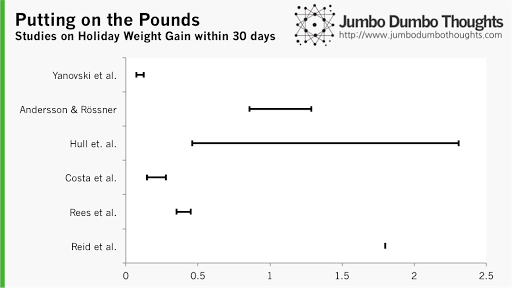
The studies are ordered by decreasing sample size, as we can rely more on evidence that is generated from larger samples. Still, the results are very diverse, estimates range from a measly 0.1kg to a whopping 2.2kg. If you’ve kept tabs on the scale and it’s within this amount, then you can take comfort in the fact that most other people will be experiencing this weight gain, too.
Battle of the bulge: one step forward, two steps back
However, there is little solace in remaining within the ‘normal’ range, as a study by Yanovski, et. al. found that weight gained in the preholiday season (October and November) and holiday season (December) is not lost in the following ‘postholiday’ period, so the fat gained during the holdays is probably a major contributor to the weight gain during a person’s lifetime. Here’s a projection over 5 years that I’ve constructed using data from the study:
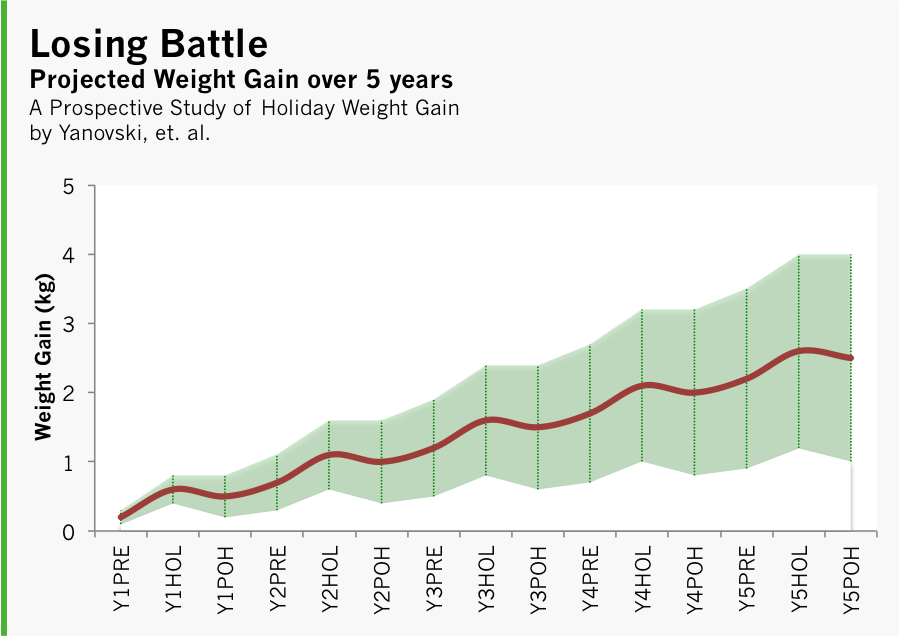
The green area indicates probable weight gain tracks, while the red line is the mean or the most likely weight gain. At the end of 5 years, your weight will probably have increased by 0.5 to 4 kg. Your goal, of course, is to be an outlier - on the negative side, that is.
There is another motivation for staying on top of your weight as early as possible, though - the same study has observed that overweight and obese persons are much more likely to experience ‘major’ holiday weight gain in excess of 2.3kg, as follows:
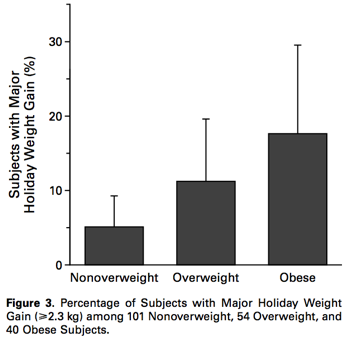
Only 5% of non-overweight individuals experienced major weight gain, while it was 10% and 18% for overweight and obese individuals, respectively. It’s a slippery slope, and once you pop, it’s hard to stop!
Secure your new years' resolution with a commitment device
Most of us will probably want to overcome the trend and lose all the holiday weight before summer, and made it our new years' resolution. Sadly, most of these resolutions will be broken after a few trips to the gym or a few weeks on a diet, but you can control the actions of your future self with what’s called a commitment device. For example, as Steven Levitt describes it:
LEVITT: If you’ve ever had really bad canker sores, or kind of cut your gums, it’s so unpleasant. So why not just slice up your gums a little bit, you know, cut up your mouth so you just don’t feel like eating at all? I think that would be a great diet approach. But people say, “No, no, no too violent, I couldn’t cut myself.” One thing I know would work is just take a little can, like say a baby food jar, and fill it with vomit. And wear it around your neck. And every time you decide that you’re hungry just open the jar and take a little sniff. And I guarantee you you will lose weight, guaranteed
Well, it’s not that bad, of course! It can be as simple as giving a friend a sum of money to be donated away upon failure. I could go on, but you would be better served by listening to one of my favorite Freakonomics podcasts.
Have a great new, year, folks! If you found this post interesting, a share or comment would be greatly appreciated. Thanks!
aliases: - 2014/01/holiday-weight-gain.html - content/blog/2014-01-01-holiday-weight-gain/holiday-weight-gain.html - posts/2014-01-01-holiday-weight-gain - articles/holiday-weight-gain
On Crappy Opinion Polls and Belt Tightening

A Nielsen survey attempted to determine the changes in spending habits when food prices rise; that is: what spending items do people prioritize or sacrifice, when food becomes more expensive?
The survey was based on results from 29,000 online respondents (albeit from different countries) across February and March 2013. Filipinos, according to the survey, would be more flexible with luxuries such as clothing, accessories, eating out, and recreation, and would prioritize household expenses, meals, education, and health.
If this survey was intended to determine whether Filipinos knew what wise spending meant, then it was probably successful. However, if the conclusion is extended to whether Filipinos would actually do so, the survey falls short of saying anything meaningful.
On Ngrams - Philippine History Quantified in Books
I’ve been messing around with the Google Ngram Viewer which was highlighted in a previous video post. If you don’t already know, ngrams are basically charts that display how often a word or phrase appears in Google’s entire book collection. It’s a rough but quick and easy way to find out what people were writing about in various time periods.
I’ve been digging around for interesting results on Philippine history and this is what I found. These range from revealing censorship in the Marcos period, proving that Rizal really was the spark of the Philippine revolution, to a weird time in the 1980s when people were crazy about the Barong Tagalog.
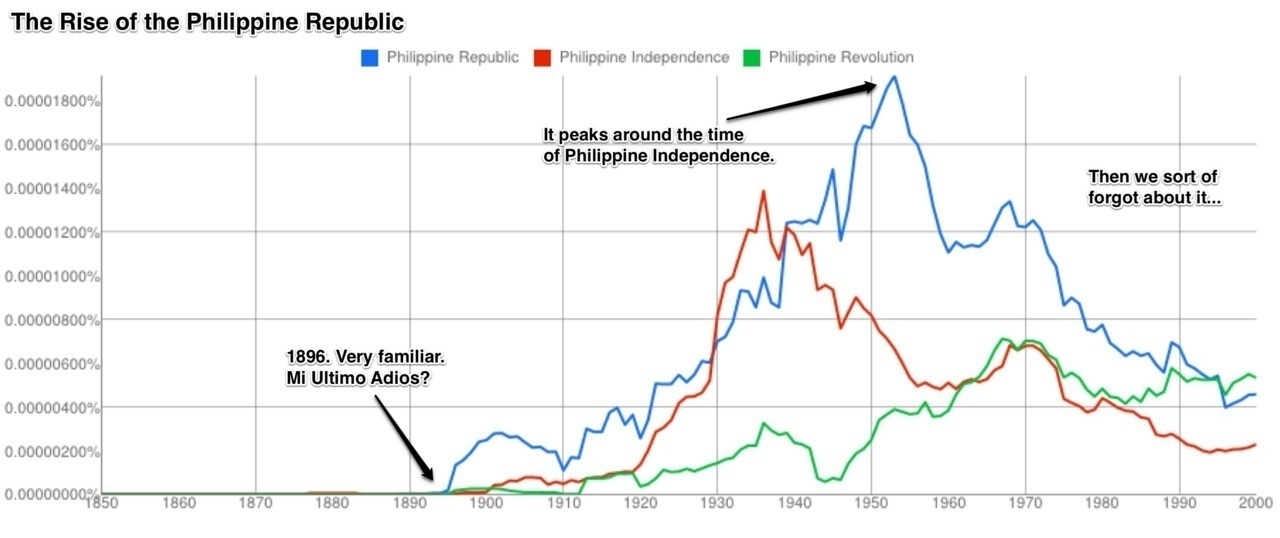
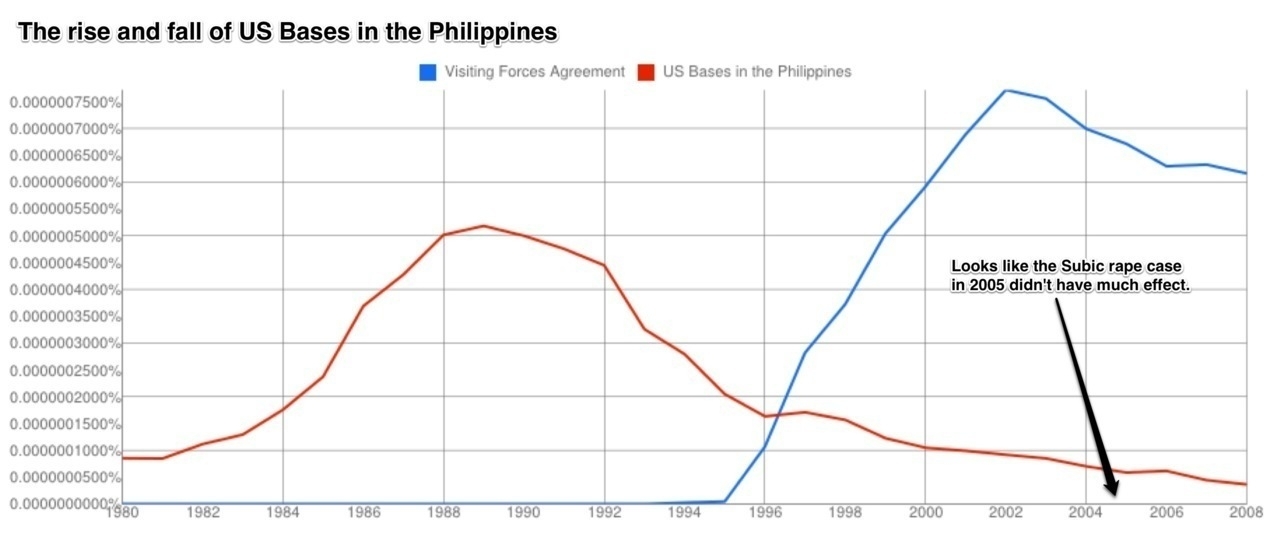
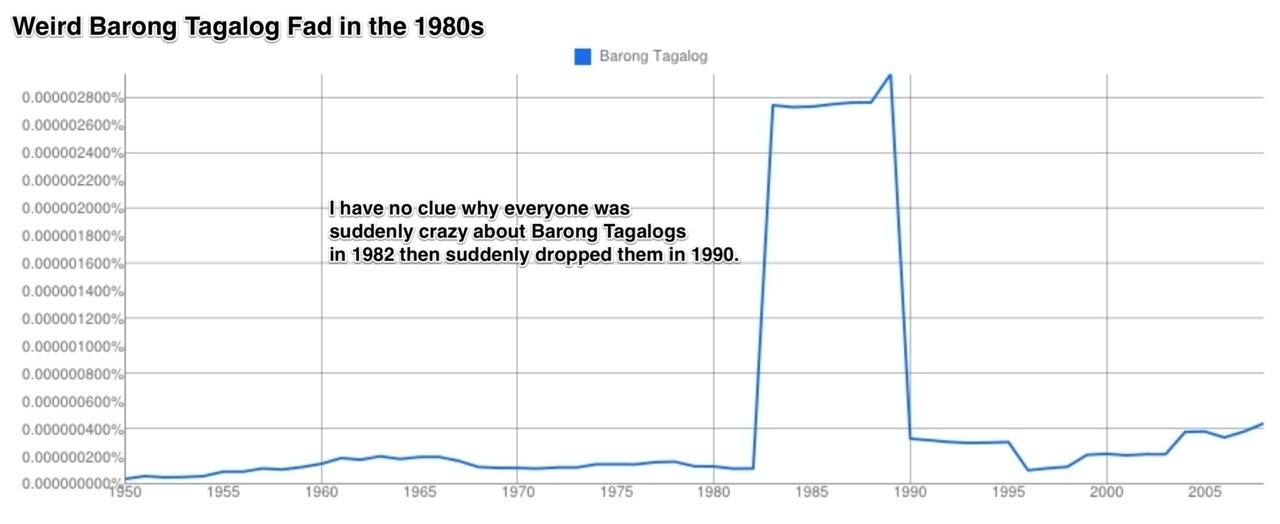
I have another set coming up soon on the Philippine economy, so watch out for that if this interests you. :D
aliases: - 2012/05/on-ngrams-philippine-history-quantified.html - content/thoughts/2012-05-14-on-ngrams-philippine-history-quantified/on-ngrams-philippine-history-quantified.html - posts/2012-05-14-on-ngrams-philippine-history-quantified - thoughts/on-ngrams-philippine-history-quantified